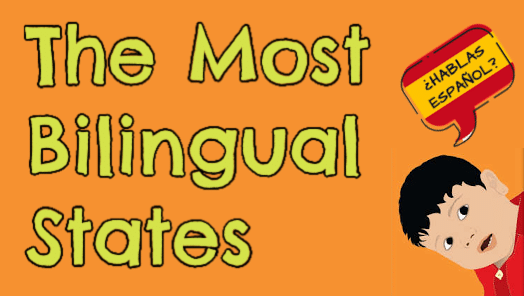Key Findings
- Top Multilingual States: Rhode Island, New Mexico, and New Jersey lead the U.S. in bilingualism, with significant populations capable of conversing in a second language.
- Linguistic Leaders: Rhode Islanders show impressive bilingualism, with 876,488 residents able to communicate in a second language.
- Low Bilingualism States: Iowa, Idaho, and Maine rank lowest in bilingualism, with less than 15% of the population that speak a second language.
- Cultural Influence in Language: States with diverse cultural heritages, like New Jersey, have higher rates of multilingualism.
- Travel and Language Reluctance: 56% of American travelers expect English to be spoken abroad, showing a reluctance to use foreign languages.
- Motivations for Learning: The primary reasons for learning a new language are educational (33%), travel (26%), personal interest (23%), and business (18%).
- Popular Languages: Spanish is the most popular language to learn (37%), followed by French, Japanese, and Italian.
- Impact on Relationships: 40% of respondents would not date someone who doesn’t speak the same language.
- AI and Language Learning: There’s a split opinion on whether AI advancements will make learning a new language redundant, with half believing in the irrelevance of bilingualism due to AI.
Implications of the Study
- Global Engagement: The enthusiasm for language learning is a positive sign of our nation’s willingness to bridge cultural divides and connect with the world in more meaningful ways.
- Cultural Integration: The high rates of bilingualism in culturally diverse states suggest that cultural heritage plays a significant role in language acquisition and interest.
- Technology and Language: The divided opinion on AI’s impact on language learning raises questions about the future role of technology in cultural and linguistic exchanges.
- Relationship Dynamics: The study’s findings on language and relationships underscore the importance of communication in personal connections and how language barriers can influence social interactions.
- Travel Expectations: The expectation of English being spoken abroad reflects a need for greater language and cultural sensitivity among American travelers.
- Diversity and Inclusion: The varied reasons for learning a second language reflect a broader understanding of the value of linguistic diversity in an increasingly interconnected world.
Methodology
Online panel survey of 3,000 adults based on age, gender, and geography. Internal data sources are used to obtain population data sets. We used a two-step process to ensure representativeness through stratified sampling and post-stratification weighting.
Respondents are carefully chosen from a geographically representative online panel of double opt-in members. This selection is further tailored to meet the precise criteria required for each unique survey. Throughout the survey, we design questions to carefully screen and authenticate respondents, guaranteeing the alignment of the survey with the ideal participants.
To ensure the integrity of our data collection, we employ an array of data quality methods. Alongside conventional measures like digital fingerprinting, bot checks, geo-verification, and speeding detection, etc. each response undergoes a thorough review by a dedicated team member to ensure quality and contextual accuracy. Our commitment extends to open-ended responses, subjecting them to scrutiny for gibberish answers and plagiarism detection.

